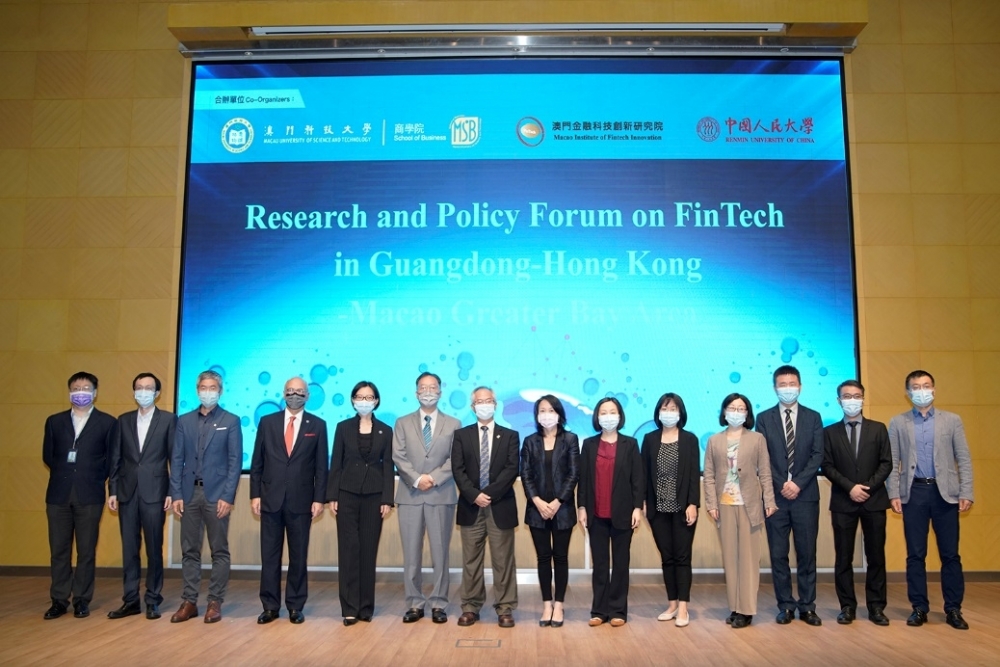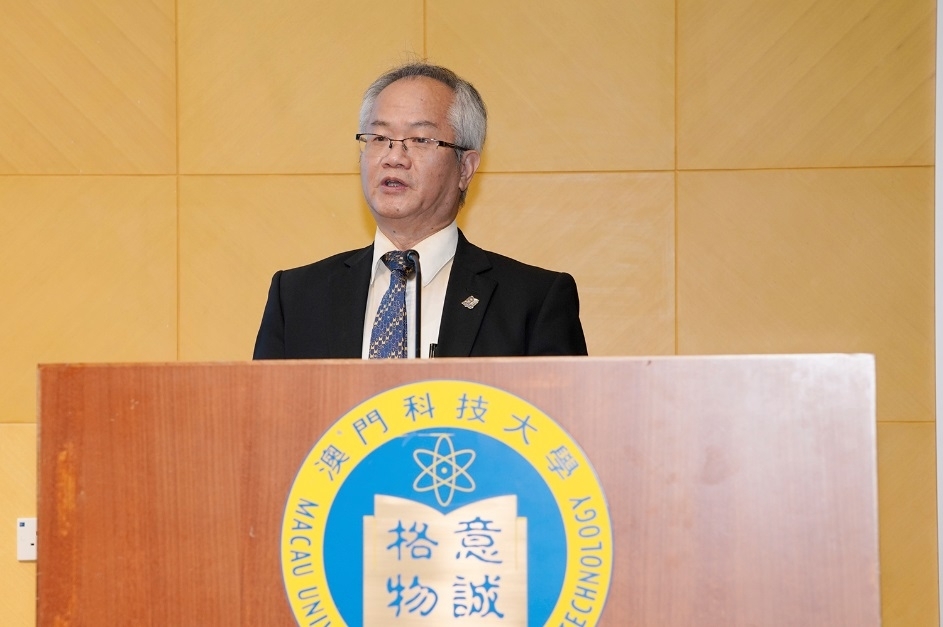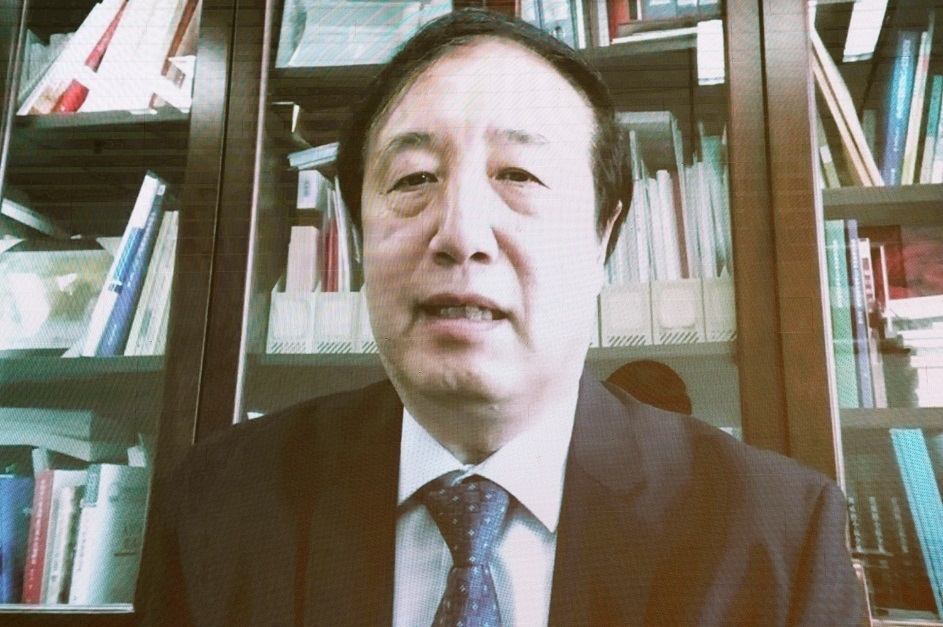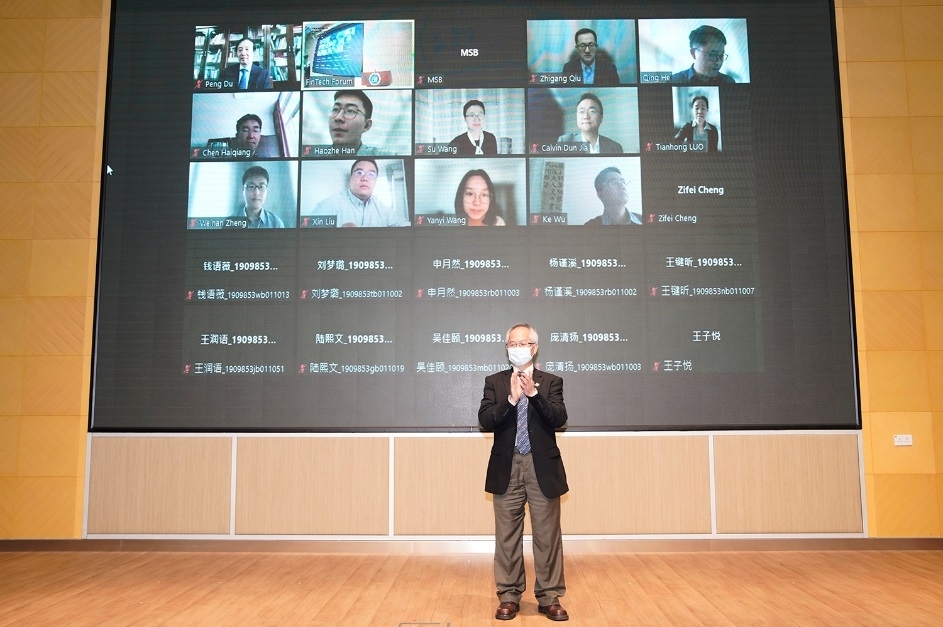The "Research and Policy Forum on FinTech in Guangdong - Hong Kong - Macao Greater Bay Area", jointly organized by the School of Business of the Macau University of Science and Technology, Macao Institute of Fintech Innovation, and Economic and Political Studies (EPS) journal of Renmin University of China, was held on November 12, 2021 at the N101 Auditorium of the Library Building. The conference aimed to provide a high-quality exchange platform for domestic and foreign scholars, policy makers and financial practitioners, to promote in-depth research and exchange on important issues in the field of FinTech, to explore the opportunities and challenges of FinTech development, and to contribute to the promotion of FinTech innovation.

Group photo of Honored guests
The conference was composed of two parts: Guangdong, Hong Kong and Macao Greater Bay Area Financial Technology Development Policy Forum and Financial Technology Development Academic Seminar, which was conducted in a combination of online and offline format. The guests of honor included Prof. Du Peng, Vice President of Renmin University of China and Editor in Chief of EPS Journal; Ms. Doreen Pun, Deputy Director of Banking Supervision Department of AMCM; Mr. Teng Lin Seng, Chairman of Alliance for Financial Stability with Information Technology; Mr. Carlos Cid r Finan, Chief Executive Officer of Banco Nacional Ultramarino; Ms. Miao Miao Du, Executive Director, General Manager and President of Macao Development Bank; Mr. Sunny Lau, Managing Director of Yonyou Software (Macao) Co., Ltd.; Chair Professor So Yuk Chow, Vice President of Macau University of Science and Technology, Dean of School of Business, and Director of Macao Institute of Fintech Innovation, Professor Sheng Ni, Executive Vice Dean of the School of Business, and more than 300 participants from Peking University, University of Hong Kong, Xiamen University, University of Amsterdam, University of Bath, as well as faculty and students from M.U.S.T. and Renmin University of China.
The opening ceremony was welcomed by Chair Professor So Yuk Chow, Vice President of Macau University of Science and Technology, and Professor. Du Peng, Vice President of Renmin University of China and Editor in Chief of Economic and Political Studies, who delivered the welcoming speeches online and offline, respectively.

Speech by Chair Professor So Yuk Chow
Vice President So pointed out at the meeting that the national development strategy of Guangdong, Hong Kong and Macao Greater Bay Area, which was approved by the State in the 14th Five-Year Plan this year, was pivotal to the development of Macao's financial industry. In spite of the severe impact of COVID-19 in Macao's economy, the national support to Macao and the sustainable development of Macao's financial industry have created opportunities. We should seize the opportunity brought by the 14th Five-Year Plan to better integrate with the national development, and use the Greater Bay Area as the best entry point to develop Macao's financial technology, thereby promoting the appropriate diversification of Macao's economy.

Speech by Professor Du. Peng
Vice President Du Peng stated that the new technological revolution led by big data, cloud computing, and blockchain had a significant impact on the whole financial industry and even the broader economic and social lifestyle; he hoped that through this conference, we could promote further research and contribute to the cultivation of financial technology talents and academic research.

Group photo of Chair Professor So Yuk Chow with online guests and attendees
The event on November 12 was divided into two parts: Guangdong, Hong Kong, Macao Greater Bay Area Financial Technology Development Policy Forum and Financial Technology Development Academic Seminar
In the Guangdong, Hong Kong, Macao Greater Bay Area Financial Technology Development Policy Forum, the keynote speech was delivered by Deputy Director of Banking Supervision Department of AMCM, Ms. Doreen Pun. She introduced the policies and a series of regulatory measures implemented by Macao to promote the development of FinTech, especially on mobile payment methods, financial crisis risk detection, and regulatory trade-offs. In the following academic presentation, Prof. Chen Haiqiang from Xiamen University discussed whether digital finance could help alleviate the problem of self-quota limitation for SMEs in applying for bank loans. He theoretically and empirically demonstrated that digital finance can help SMEs obtain bank loans by reducing information asymmetry and enhancing SMEs' financial literacy. Later, Professor Zhou Ligang from M.U.S.T. introduced credit risk modeling on data with two timestamps in peer-to-peer lending by gradient boosting.
In the Financial Technology Development Academic Seminar, Associate Professor Huang Shiyang from University of Hong Kong shared an innovative research result. He compared the two transaction systems represented by the decentralized Uniswap and the centralized Binance, and suggested that decentralized cryptocurrency transactions can help to reach a decentralized consensus on the value of cryptocurrency and overcome the drawbacks of centralized transaction systems due to the lack of external regulation. Assistant Professor Liu Xin from Renmin University of China examines whether the increasing use of machine learning has improved market efficiency, and her empirical results confirm it. Assistant Professor Dun Jia, Peking University, discussed the impact of the rapid development of FinTech in China on traditional banking, particularly in the deposit business. He found that there were two mutually exclusive effects of the expansion of the FinTech sector on commercial banks' deposit-like liabilities - the interdepartmental substitution effect and the overall wealth effect of the deposit and platform banking markets. Next, Associate Professor Wu Ke, Renmin University of China, reported on the value effects of financial technology innovation on the Chinese financial sector, especially the banking system. The study first used python to obtain patent application information, and found that financial technology patents negatively influenced the financial industry, especially the banking industry. Assistant Professor Wang Su, University of Amsterdam, demonstrated that using managerial turnover data was effective in predicting the future performance of small firms and start-ups, and that the predictive effect was better than traditional financial information indicators. Assistant Professor Sun Hanwen, University of Bath, commented on the paper and discussed selection bias and endogenous issues. Associate Professor Luo Tianhong of School of International Relations, Renmin University of China, and Associate Editor of Economic and Political Studies, gave the concluding remarks.
The seminar presentations were fascinating and the discussions were lively and in-depth, promoting the attention of the participants and students on FinTech-related issues. The forum enhanced the exchanges between scholars in and out of the country, strengthened the understanding of FinTech and led the research on FinTech through brainstorming.





